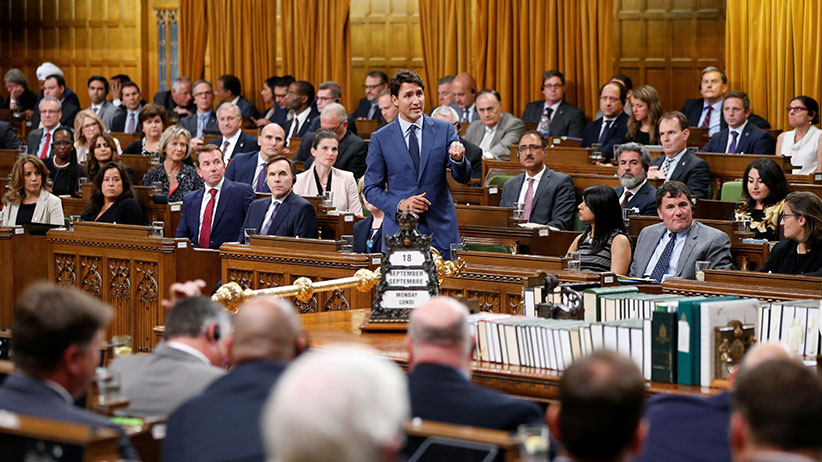Hyper parliamentarians are back in the House of Commons
On Parliament’s return there was debate, fist-pumping, dumpster diving, and one moment of manners as MPs reflected on a tragedy
Canada’s Prime Minister Justin Trudeau speaks during Question Period in the House of Commons on Parliament Hill in Ottawa, Ontario, Canada, September 18, 2017. (Chris Wattie/Reuters)
Share

Majority, schplajority; the opposition made its side heard. Andrew Scheer warned new tax rules will force farmers to sell their land and rent it back from foreign owners, to tend their fields as mere tenants, clarified when Scheer’s colleague cried, “serfs!”
Parliament made a rambunctious return on Monday, when members chirped and guffawed their way through the first autumnal question period. Taxation, migration, confiscation of socks—topics bounced from privacy rights at border crossings to economic prosperity to child abduction. Hyper, the members flung soliloquies at the Speaker of the House, who might’ve more accurately been called the Listener, and often the only one.
“I suggest the opposition is getting wildly out of hand,” said Liberal member Wayne Easter, and his teammate added: “I ask the opposition to contain their enthusiasm until it’s their turn to speak.” Getting straight to business of hyperbolizing each other’s awfulness, the Conservatives portrayed their opponents as buddies of billionaires who will tax fishermen and other small business owners, as if constituents were scraping by on potatoes to the benefit of the elitist, snobbish, couscous of a caucus.
READ MORE: Parliament returns, and it’s a bit of a mess
“Would the Minister of Finance come back down to Earth with the rest of us mortals?” asked Lisa Raitt of Bill Morneau, to such hoopla from her team that it nearly muted her supplementary point. “Cause we all know there’s no pension in fishing.”
And there’s no privacy in Bill C-21, New Democrats argued, for the proposal to amend the Customs Act will share information with the United States about who leaves Canada. Sharing could help detect abducted children at the border—officials in Saint-Eustache, Que., last week called an amber alert for a six-year-old. Bill C-21 would let the government more closely track people’s movements, and the NDP’s Matthew Dube also worried about granting border guards the power to search a traveler’s electronics.
“It doesn’t matter if you search someone’s socks or underwear in their suitcase, but a cell phone is a different [subject],” said Dube, accusing the government of creating unclear rules. “It’s about time they start hitting the brakes on this willy-nilly string of information,” he said.
Willy-nilliness extended to foreign policy critique, as Thomas Mulcair blamed the government for supplying weapons to Saudi Arabia, despite its predecessor’s work on an international treaty against landmines. Between talk of Lloyd Axworthy and what’s tax-worthy, Liberal Francesco Sorbara came jogging to his seat just in time for his speech, panting while he spoke, and departed shortly after his remarks in a deliver-and-dash.
The Government of Canada looked civil, mostly. Justin Trudeau’s collar was folded as crisply as origami. Each fibre of the velvet carpet was swiped in the same direction. However, Liberal Brenda Shanahan returned from summer with scabs on her face. “Please do not be alarmed by the state of my visage,” she said. “I did a little face-planting on the weekend, but it’s all good.”
Theresa May, by the way, was visiting. Canons fired, and a regiment outside performed a brief tattoo, before the British prime minister officially signed a guest book in the rotunda. Elizabeth May, meanwhile, using the bathroom down the hall, dunked her hand into the garbage can, extracted a handful of used paper towel and transplanted it to the proper wastepaper bin. Recycle, people.
RELATED: Canada’s House of Commons doesn’t need to be modernized
Dumpster dives were complemented with fist-pumping back in the House, as May cheered at the mention of suspending the Energy East pipeline. Conservative Erin O’Toole pretended to challenge Foreign Affairs Minister Chrystia Freeland to an arm-wrestle, though she responded with an air hug.
Members were finally reminded of their manners, and their mission, when they reflected on a tragedy. Arnold Chan, the late MP for Scarborough-Agincourt, had died of cancer four days earlier. His friends unclenched their fists, and Trudeau stopped fiddling with the wire of his headset and dedicated words. “He once told me the scope of the impact he could have on this house was limited,” said Trudeau. “I’m going to have to disagree on the member’s assessment of his own legacy.” He recalled the member’s final speech on June 12. “That day, Arnold advised us to listen to one another, for he believed that listening ought to be the guiding principle of our democracy.”
One by one the members swivelled their heads up to the gallery as they realized they were in the presence of Chan’s wife, Jean, and their three sons, Theodore, Nathaniel and Ethan. The members clapped and clapped, and kept clapping past the time when they might’ve stopped clapping, standing up from their chairs.
May cried. “Arnold clearly struggled. He was in pain,” she said of his committee work throughout chemotherapy. “I kept hoping and praying that Arnold would not leave us, but you know, we’re all mortal.” His family couldn’t see May in the corner of the room, so the widow leaned her stomach over the rail of the balcony, and security officers didn’t correct her.
May implored Parliament to take up Arnold’s call to reform their behaviour and listen to each other. She explained Arnold’s parting words like Trudeau had done, but she made one correction. “With all due respect to my friend the Prime Minister,” May said, “that was not advice. That was an instruction.”
Clarification, Sept 20: This article previously stated that Bill C-21 would grant border guards the power to search a traveler’s electronics. The privacy concern arose from a member of Parliament but is not an aspect of the legislation.